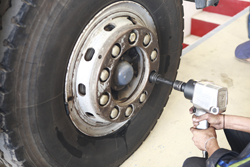Paul Goggins MP led a debate in the House of Commons on the issue of wheel safety: tyres are regulated and carry marks, but there's no such system for wheels.
The Department for Transport has appointed a senior official to oversee the wheel supply industry, clamping down on defective wheels or companies supplying them.
The appointment came after Paul Goggins MP led a debate in the House of Commons on the issue of wheel safety. He had been alerted by a company in his constituency – Motor Wheel Service based in Sharston, the largest distributor of HGV wheels in the UK and Europe - to the lack of an adequate system for checking and inspecting HGV wheels. His efforts won him the award of Parliamentarian of the Month.
 Mr Goggins secured a House of Commons debate in March 2011 where the road safety minister Mike Penning reviewed evidence and agreed to the appointment.
Mr Goggins secured a House of Commons debate in March 2011 where the road safety minister Mike Penning reviewed evidence and agreed to the appointment.
Paul Goggins said, “Tyres are heavily regulated. Look at any tyre and you will see an ‘E’ mark printed on the wall confirming that it is approved and meets set standards. But when it comes to wheels there are no regulations or markings. As it stands, a wheel could be damaged in a serious accident and be back on the road the very next day, fitted to a different vehicle without any inspection or accountability.”
He continued, “The Vehicle and Operator Services Agency (VOSA) has never been tasked to inspect wheels when checking HGVs. Whilst the loss of a wheel in an accident would be viewed seriously, in other incidents and accidents VOSA will rarely look to see if wheel failure has caused the problem.”
Wheel suppliers believe that there has been a rise – approximately 10,000 per annum – of substandard and potentially hazardous second-hand HGV wheels entering the UK market. There has also been a rise in the number of commercial vehicle wheels sourced from the Far East and entering the country without any requirement to meet minimum standards of design, safety and maintenance. These wheels have no history or traceability, yet they can be sold by anybody in the UK with no requirements for technical procedures to assess their history.
An HGV wheel can be damaged in several ways:
- Dents and cracks caused by over-tightening of the wheel nuts;
- Dents and cracks caused by collision including by accidents, pot-holes and kerbs;
- Rust and wear and tear caused by weather and road surface conditions;
- Rust and wear and tear caused by age;
- Incorrect tyre fitting.
The implications of purchasing a faulty wheel are huge. A 45-tonne lorry travelling at 55mph can cause serious damage if a tyre fails. There are numerous measures to prevent this from occurring yet few preventive measures are in place to avoid wheel failure from causing the same damage.